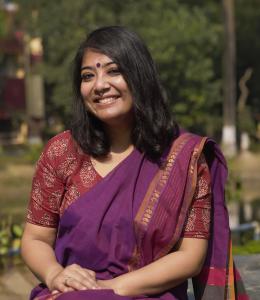
Dr Anurima Chanda
Charles Wallace India Trust Fellow, March - July 2025
Home Institution: Birsa Munda College, University of North Bengal
Dr Anurima Chanda is an academic, translator, and children’s author. Her research interests include Indian English children’s literature, Dalit studies, and translation. She is an Assistant Professor of English at Birsa Munda College under the University of North Bengal. An alumna of Lady Shri Ram College (Delhi University) and Jawaharlal Nehru University (JNU), she completed her PhD from the latter, focusing on contemporary Indian English children’s literature. She has held a Pre-Doctoral DAAD Fellowship at the University of Würzburg, a SUSI Fellowship (2023) at the University of Montana, and was a member of the four-member team in the UKIERI Trilateral Research Project involving JNU (India), Bangor University (UK), and West Virginia University (USA). Her notable works include Women of India (DK Publishing), translations of Manoranjan Byapari’s Itibrittye Chandal Jibon (How I Became a Writer) (Stree Samya and Sage), and Sharan Kumar Limbale’s Akkarmashi (Bejonma) (Doshor Publications), and a co-edited critical companion to Tintin in Tibet (Worldview).
Project Title: In Search of the Indian Child: Decolonising Childhood Studies Through a Study of Indian Periodicals
This research seeks to extract indigenous theories of childhood in colonial India by exploring English and indigenous periodicals from the colonial era. Current scholarship on South Asian children’s literature often relies heavily on Western models of childhood studies, overlooking culturally specific factors such as caste, class, religion, and community that shape Indian childhoods. This project aims to shift the discourse by identifying frameworks rooted in local knowledge production during the colonial period.
Periodicals of the time emerged as critical spaces for producing and disseminating ideas on childhood, offering a platform for alternate narratives on education, culture, and identity formation. These publications not only hosted nationalist and social discussions but also featured works written for and by children. By analysing this corpus, the research aims to understand how the figure of the Indian child was envisioned, how notions of child-suitability in literature were determined, and the extent to which children themselves influenced their narratives.
The project aims to engage with evolving theories of childhood in India through multiple avenues, including a critical editorial piece for the Association for Children’s Literature in South Asia (ACLiSA), a broader study on childhood discourses, and the development of research resources on periodicals. By examining these underexplored materials, this study seeks to contribute to ongoing conversations in decolonial childhood studies, challenging universalising Eurocentric frameworks and fostering a more representative understanding of childhoods in South Asia.
